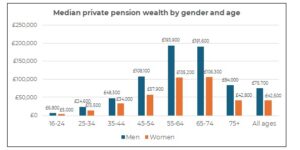Women are retiring with significantly less pension wealth than men, putting them at greater financial risk in later life, new data shows. The median private pension savings for men stand at £75,700, while women have just £42,500, a difference of over £33,000.
The disparity grows as employees approach retirement, with some women nearly £100,000 worse off than men. The pension gap exists across all age groups but becomes most severe in the years leading up to retirement, the latest Wealth & Assets Survey, conducted by financial services consultancy Broadstone, found.
By ages 45-54, men have £108,100 in pension savings, which is £50,200 more than women’s £57,900. The gap continues to widen, reaching £88,700 among those aged 55-64, with men holding £193,900 in pension savings compared to women’s £105,200.

At retirement age (65-74), men have a median of £191,600 in private pensions — £85,300 more than women’s £106,300. The figures suggest that women are at far greater risk of financial insecurity in later life, relying more on the state pension or a partner’s income.
The Root Causes of the Gender Pension Gap
Several long-standing financial barriers contribute to women retiring with less savings and fewer financial protections:
- Lower Lifetime Earnings – The gender pay gap reduces the amount women can save over their careers.
- Career Breaks for Caring Responsibilities – Women are more likely to pause work for childcare or eldercare, resulting in lower pension contributions.
- Part-Time and Low-Paid Work – Many women work part-time, often in jobs with fewer benefits and reduced employer pension contributions.
- Missed Auto-Enrolment – Those earning below the £10,000 threshold for automatic pension enrolment miss out on employer contributions.
Long-Term Financial Risks
The pension gap has serious consequences for women’s financial wellbeing:
- Later Retirement – Many women delay retirement or continue working out of financial necessity.
- Reliance on Partner’s Pension – Those in heterosexual relationships often depend on a spouse’s savings, which can leave them vulnerable in cases of divorce or widowhood.
- Increased Risk of Pension Poverty – Women with smaller private pensions may struggle to afford essentials in retirement.
Rachel Coles, workplace engagement consultant at Broadstone, said more needs to be done to ensure women can retire with financial security.
“Private pension savings are vital to achieving a decent standard of living in retirement by providing supplementary income to State-provided sources via benefits or the State Pension,” she said.
Coles said the figures show that women need more support to encourage them to put more towards their pension pots. “Financial education will be a major part of building up awareness of the importance of later-life savings, the tax efficient benefits of pensions and how factors like starting to save as early as possible can help maximise savings by the point of retirement,” she said.
“In couples where there is an unequal distribution of wealth, the data also demonstrates the need for careful estate planning to ensure wealth can pass from husband to wife in the event of a death.”
What Can Employers Do to Close the Gap?
Employers have a key role in ensuring women are not left behind in pension planning, experts say. Strategies to reduce the gender pension gap include:
- Encouraging Early Contributions – Raising awareness of how starting pension savings earlier can make a significant long-term difference.
- Offering Pension Contribution Flexibility – Allowing women returning from maternity leave or career breaks to increase contributions without penalty.
- Providing Financial Education – Helping female employees understand pension tax relief, employer-matching benefits, and strategies to boost retirement savings.
- Addressing Pay Gaps – Closing salary disparities ensures that women can contribute more towards pensions throughout their careers.
Without intervention, the gender pension gap will continue to leave women at a financial disadvantage in retirement, say analysts. The latest data serves as a warning that systemic changes — including policy reforms, employer initiatives and individual financial planning — are needed to ensure women can retire with security and independence, they say.


